Management and Leadership Development for Starfish Oil Company
VerifiedAdded on 2022/08/28
|14
|3583
|18
Report
AI Summary
This report provides a comprehensive analysis of management and leadership development (MLD) strategies, focusing on Starfish Oil, a company expanding into Asian markets. It defines MLD, differentiating between management and leadership, and emphasizes the importance of customer satisfaction and revenue generation in the context of market challenges. The report evaluates the integrated approach to MLD, highlighting the significance of experimental learning and the need for companies to empower employees in host markets while maintaining ethical practices. It then offers recommendations to Starfish Oil regarding the adoption of formal and informal techniques, including change management strategies and employee participation, to enhance their MLD approach, ensuring a balance between empowering employees and maintaining corporate governance. The report concludes with a discussion on the role of experience and the importance of ethical considerations in MLD.
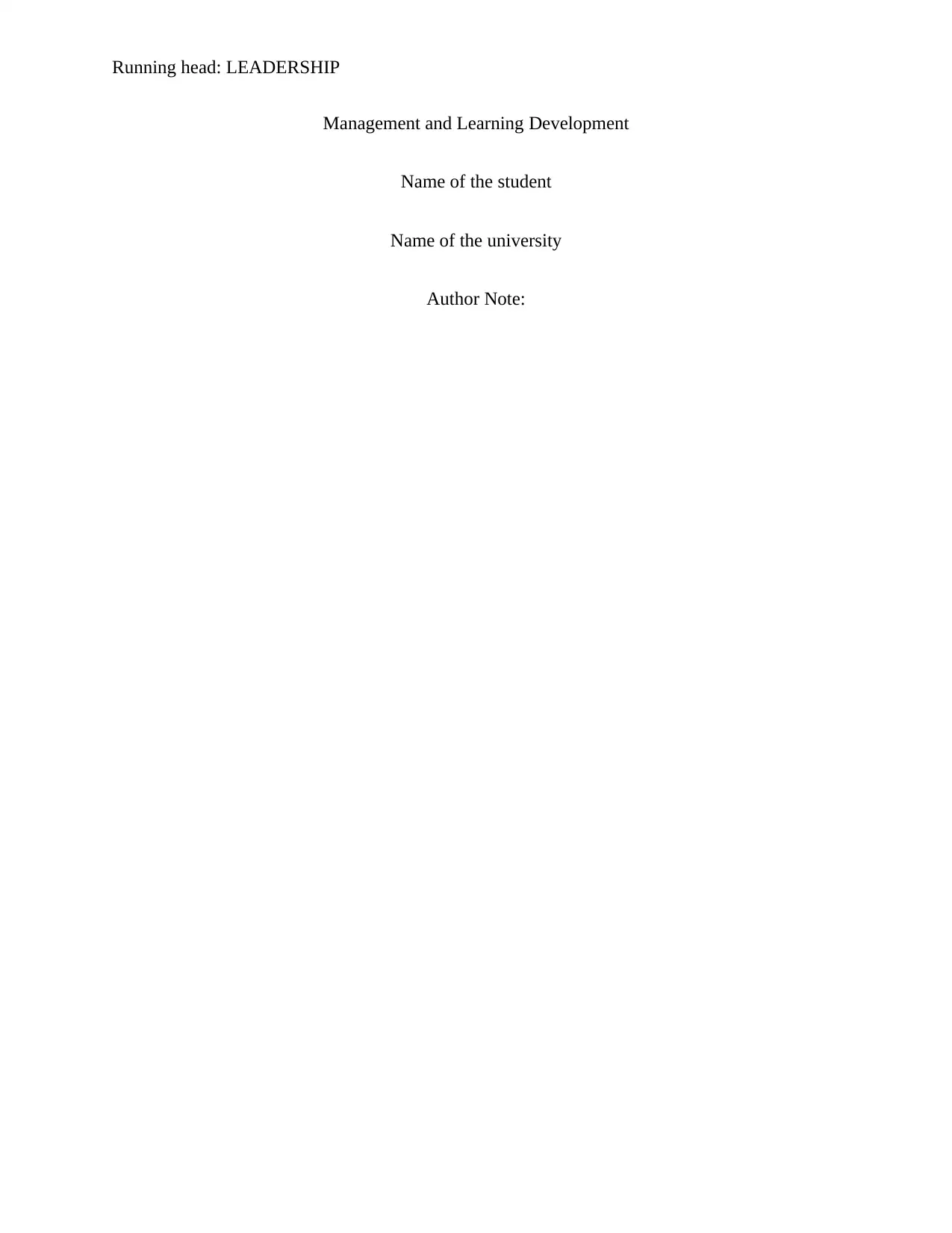
Running head: LEADERSHIP
Management and Learning Development
Name of the student
Name of the university
Author Note:
Management and Learning Development
Name of the student
Name of the university
Author Note:
Paraphrase This Document
Need a fresh take? Get an instant paraphrase of this document with our AI Paraphraser
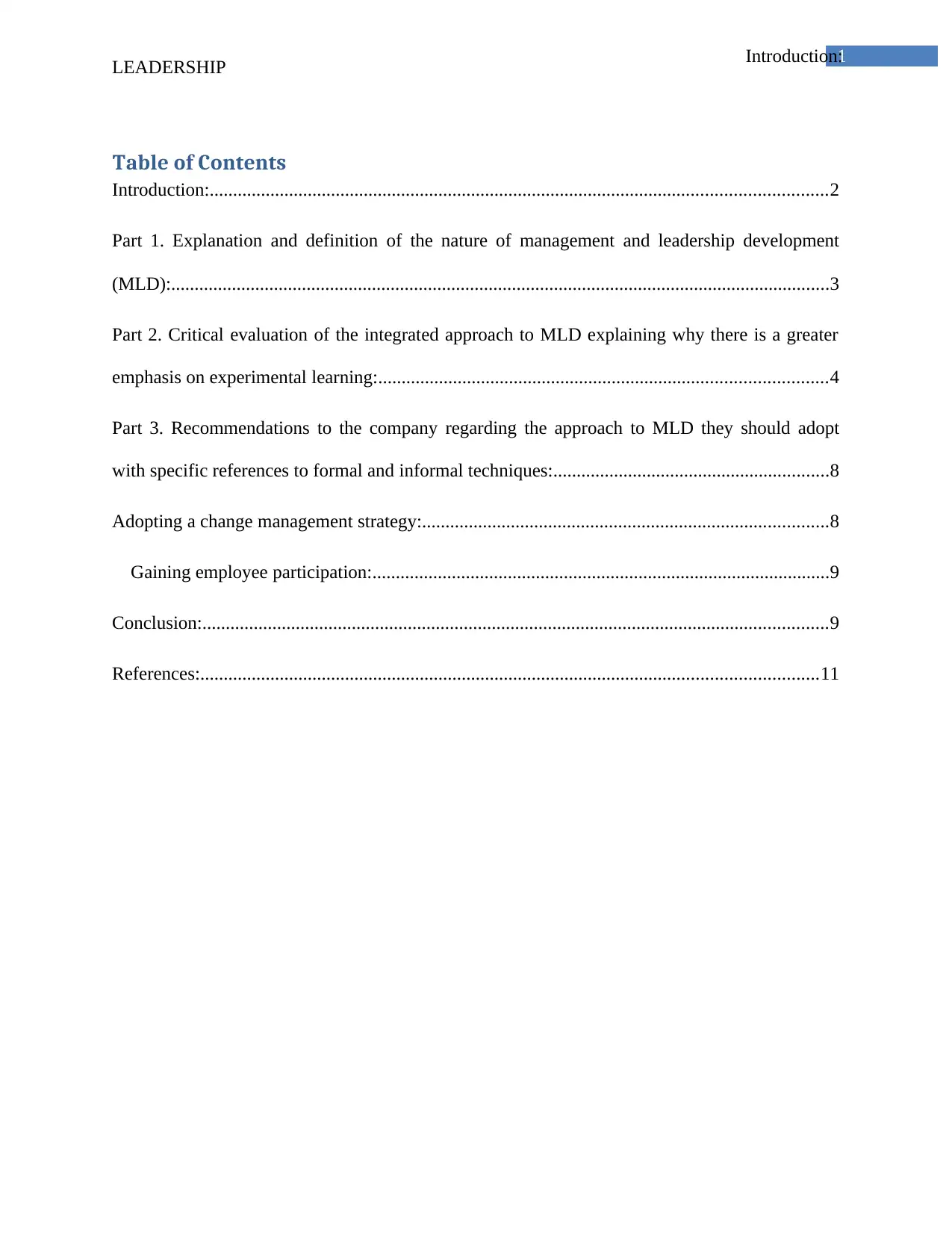
1Introduction:
LEADERSHIP
Table of Contents
Introduction:....................................................................................................................................2
Part 1. Explanation and definition of the nature of management and leadership development
(MLD):.............................................................................................................................................3
Part 2. Critical evaluation of the integrated approach to MLD explaining why there is a greater
emphasis on experimental learning:................................................................................................4
Part 3. Recommendations to the company regarding the approach to MLD they should adopt
with specific references to formal and informal techniques:...........................................................8
Adopting a change management strategy:.......................................................................................8
Gaining employee participation:..................................................................................................9
Conclusion:......................................................................................................................................9
References:....................................................................................................................................11
LEADERSHIP
Table of Contents
Introduction:....................................................................................................................................2
Part 1. Explanation and definition of the nature of management and leadership development
(MLD):.............................................................................................................................................3
Part 2. Critical evaluation of the integrated approach to MLD explaining why there is a greater
emphasis on experimental learning:................................................................................................4
Part 3. Recommendations to the company regarding the approach to MLD they should adopt
with specific references to formal and informal techniques:...........................................................8
Adopting a change management strategy:.......................................................................................8
Gaining employee participation:..................................................................................................9
Conclusion:......................................................................................................................................9
References:....................................................................................................................................11
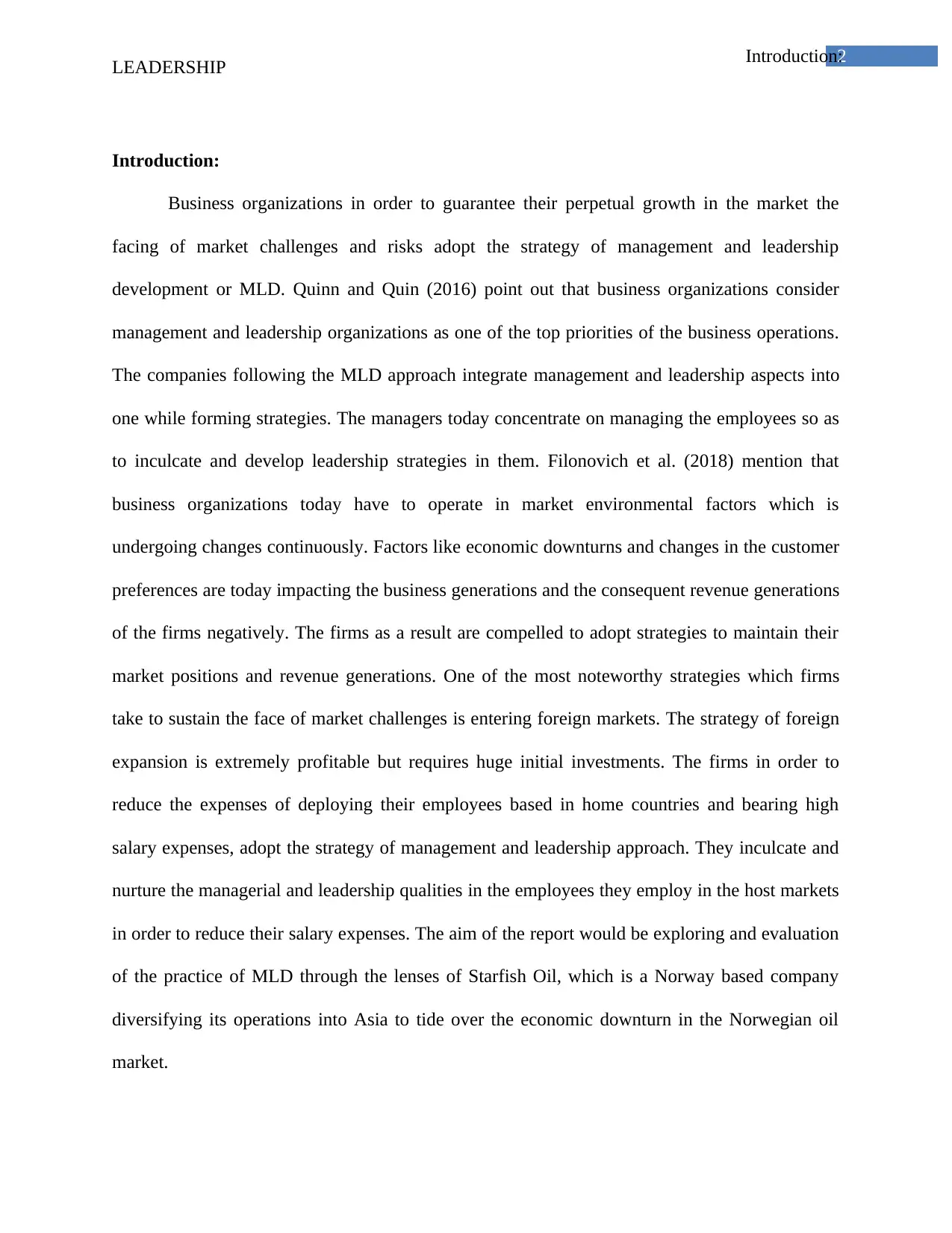
2Introduction:
LEADERSHIP
Introduction:
Business organizations in order to guarantee their perpetual growth in the market the
facing of market challenges and risks adopt the strategy of management and leadership
development or MLD. Quinn and Quin (2016) point out that business organizations consider
management and leadership organizations as one of the top priorities of the business operations.
The companies following the MLD approach integrate management and leadership aspects into
one while forming strategies. The managers today concentrate on managing the employees so as
to inculcate and develop leadership strategies in them. Filonovich et al. (2018) mention that
business organizations today have to operate in market environmental factors which is
undergoing changes continuously. Factors like economic downturns and changes in the customer
preferences are today impacting the business generations and the consequent revenue generations
of the firms negatively. The firms as a result are compelled to adopt strategies to maintain their
market positions and revenue generations. One of the most noteworthy strategies which firms
take to sustain the face of market challenges is entering foreign markets. The strategy of foreign
expansion is extremely profitable but requires huge initial investments. The firms in order to
reduce the expenses of deploying their employees based in home countries and bearing high
salary expenses, adopt the strategy of management and leadership approach. They inculcate and
nurture the managerial and leadership qualities in the employees they employ in the host markets
in order to reduce their salary expenses. The aim of the report would be exploring and evaluation
of the practice of MLD through the lenses of Starfish Oil, which is a Norway based company
diversifying its operations into Asia to tide over the economic downturn in the Norwegian oil
market.
LEADERSHIP
Introduction:
Business organizations in order to guarantee their perpetual growth in the market the
facing of market challenges and risks adopt the strategy of management and leadership
development or MLD. Quinn and Quin (2016) point out that business organizations consider
management and leadership organizations as one of the top priorities of the business operations.
The companies following the MLD approach integrate management and leadership aspects into
one while forming strategies. The managers today concentrate on managing the employees so as
to inculcate and develop leadership strategies in them. Filonovich et al. (2018) mention that
business organizations today have to operate in market environmental factors which is
undergoing changes continuously. Factors like economic downturns and changes in the customer
preferences are today impacting the business generations and the consequent revenue generations
of the firms negatively. The firms as a result are compelled to adopt strategies to maintain their
market positions and revenue generations. One of the most noteworthy strategies which firms
take to sustain the face of market challenges is entering foreign markets. The strategy of foreign
expansion is extremely profitable but requires huge initial investments. The firms in order to
reduce the expenses of deploying their employees based in home countries and bearing high
salary expenses, adopt the strategy of management and leadership approach. They inculcate and
nurture the managerial and leadership qualities in the employees they employ in the host markets
in order to reduce their salary expenses. The aim of the report would be exploring and evaluation
of the practice of MLD through the lenses of Starfish Oil, which is a Norway based company
diversifying its operations into Asia to tide over the economic downturn in the Norwegian oil
market.
⊘ This is a preview!⊘
Do you want full access?
Subscribe today to unlock all pages.

Trusted by 1+ million students worldwide
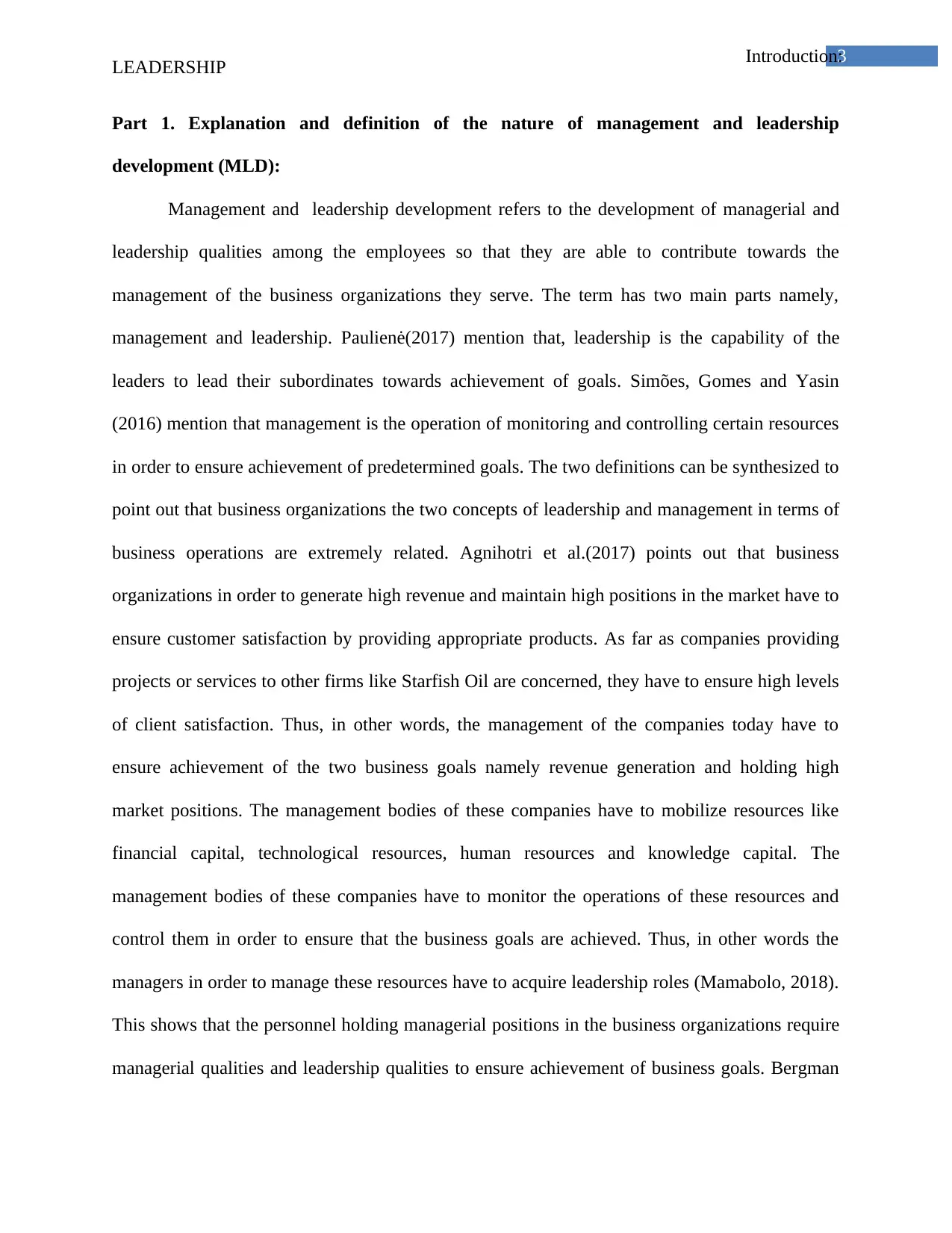
3Introduction:
LEADERSHIP
Part 1. Explanation and definition of the nature of management and leadership
development (MLD):
Management and leadership development refers to the development of managerial and
leadership qualities among the employees so that they are able to contribute towards the
management of the business organizations they serve. The term has two main parts namely,
management and leadership. Paulienė(2017) mention that, leadership is the capability of the
leaders to lead their subordinates towards achievement of goals. Simões, Gomes and Yasin
(2016) mention that management is the operation of monitoring and controlling certain resources
in order to ensure achievement of predetermined goals. The two definitions can be synthesized to
point out that business organizations the two concepts of leadership and management in terms of
business operations are extremely related. Agnihotri et al.(2017) points out that business
organizations in order to generate high revenue and maintain high positions in the market have to
ensure customer satisfaction by providing appropriate products. As far as companies providing
projects or services to other firms like Starfish Oil are concerned, they have to ensure high levels
of client satisfaction. Thus, in other words, the management of the companies today have to
ensure achievement of the two business goals namely revenue generation and holding high
market positions. The management bodies of these companies have to mobilize resources like
financial capital, technological resources, human resources and knowledge capital. The
management bodies of these companies have to monitor the operations of these resources and
control them in order to ensure that the business goals are achieved. Thus, in other words the
managers in order to manage these resources have to acquire leadership roles (Mamabolo, 2018).
This shows that the personnel holding managerial positions in the business organizations require
managerial qualities and leadership qualities to ensure achievement of business goals. Bergman
LEADERSHIP
Part 1. Explanation and definition of the nature of management and leadership
development (MLD):
Management and leadership development refers to the development of managerial and
leadership qualities among the employees so that they are able to contribute towards the
management of the business organizations they serve. The term has two main parts namely,
management and leadership. Paulienė(2017) mention that, leadership is the capability of the
leaders to lead their subordinates towards achievement of goals. Simões, Gomes and Yasin
(2016) mention that management is the operation of monitoring and controlling certain resources
in order to ensure achievement of predetermined goals. The two definitions can be synthesized to
point out that business organizations the two concepts of leadership and management in terms of
business operations are extremely related. Agnihotri et al.(2017) points out that business
organizations in order to generate high revenue and maintain high positions in the market have to
ensure customer satisfaction by providing appropriate products. As far as companies providing
projects or services to other firms like Starfish Oil are concerned, they have to ensure high levels
of client satisfaction. Thus, in other words, the management of the companies today have to
ensure achievement of the two business goals namely revenue generation and holding high
market positions. The management bodies of these companies have to mobilize resources like
financial capital, technological resources, human resources and knowledge capital. The
management bodies of these companies have to monitor the operations of these resources and
control them in order to ensure that the business goals are achieved. Thus, in other words the
managers in order to manage these resources have to acquire leadership roles (Mamabolo, 2018).
This shows that the personnel holding managerial positions in the business organizations require
managerial qualities and leadership qualities to ensure achievement of business goals. Bergman
Paraphrase This Document
Need a fresh take? Get an instant paraphrase of this document with our AI Paraphraser
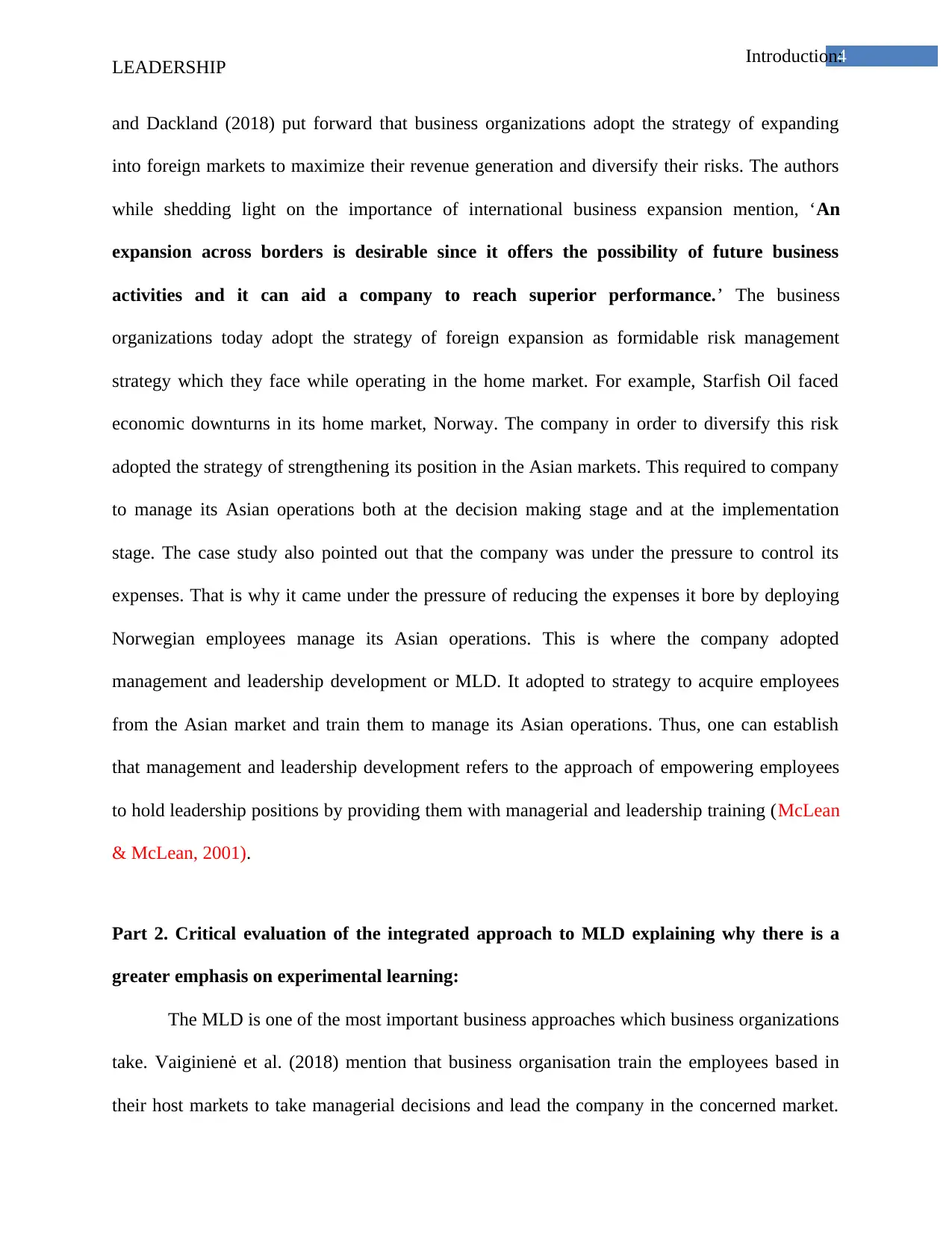
4Introduction:
LEADERSHIP
and Dackland (2018) put forward that business organizations adopt the strategy of expanding
into foreign markets to maximize their revenue generation and diversify their risks. The authors
while shedding light on the importance of international business expansion mention, ‘An
expansion across borders is desirable since it offers the possibility of future business
activities and it can aid a company to reach superior performance.’ The business
organizations today adopt the strategy of foreign expansion as formidable risk management
strategy which they face while operating in the home market. For example, Starfish Oil faced
economic downturns in its home market, Norway. The company in order to diversify this risk
adopted the strategy of strengthening its position in the Asian markets. This required to company
to manage its Asian operations both at the decision making stage and at the implementation
stage. The case study also pointed out that the company was under the pressure to control its
expenses. That is why it came under the pressure of reducing the expenses it bore by deploying
Norwegian employees manage its Asian operations. This is where the company adopted
management and leadership development or MLD. It adopted to strategy to acquire employees
from the Asian market and train them to manage its Asian operations. Thus, one can establish
that management and leadership development refers to the approach of empowering employees
to hold leadership positions by providing them with managerial and leadership training (McLean
& McLean, 2001).
Part 2. Critical evaluation of the integrated approach to MLD explaining why there is a
greater emphasis on experimental learning:
The MLD is one of the most important business approaches which business organizations
take. Vaiginienė et al. (2018) mention that business organisation train the employees based in
their host markets to take managerial decisions and lead the company in the concerned market.
LEADERSHIP
and Dackland (2018) put forward that business organizations adopt the strategy of expanding
into foreign markets to maximize their revenue generation and diversify their risks. The authors
while shedding light on the importance of international business expansion mention, ‘An
expansion across borders is desirable since it offers the possibility of future business
activities and it can aid a company to reach superior performance.’ The business
organizations today adopt the strategy of foreign expansion as formidable risk management
strategy which they face while operating in the home market. For example, Starfish Oil faced
economic downturns in its home market, Norway. The company in order to diversify this risk
adopted the strategy of strengthening its position in the Asian markets. This required to company
to manage its Asian operations both at the decision making stage and at the implementation
stage. The case study also pointed out that the company was under the pressure to control its
expenses. That is why it came under the pressure of reducing the expenses it bore by deploying
Norwegian employees manage its Asian operations. This is where the company adopted
management and leadership development or MLD. It adopted to strategy to acquire employees
from the Asian market and train them to manage its Asian operations. Thus, one can establish
that management and leadership development refers to the approach of empowering employees
to hold leadership positions by providing them with managerial and leadership training (McLean
& McLean, 2001).
Part 2. Critical evaluation of the integrated approach to MLD explaining why there is a
greater emphasis on experimental learning:
The MLD is one of the most important business approaches which business organizations
take. Vaiginienė et al. (2018) mention that business organisation train the employees based in
their host markets to take managerial decisions and lead the company in the concerned market.
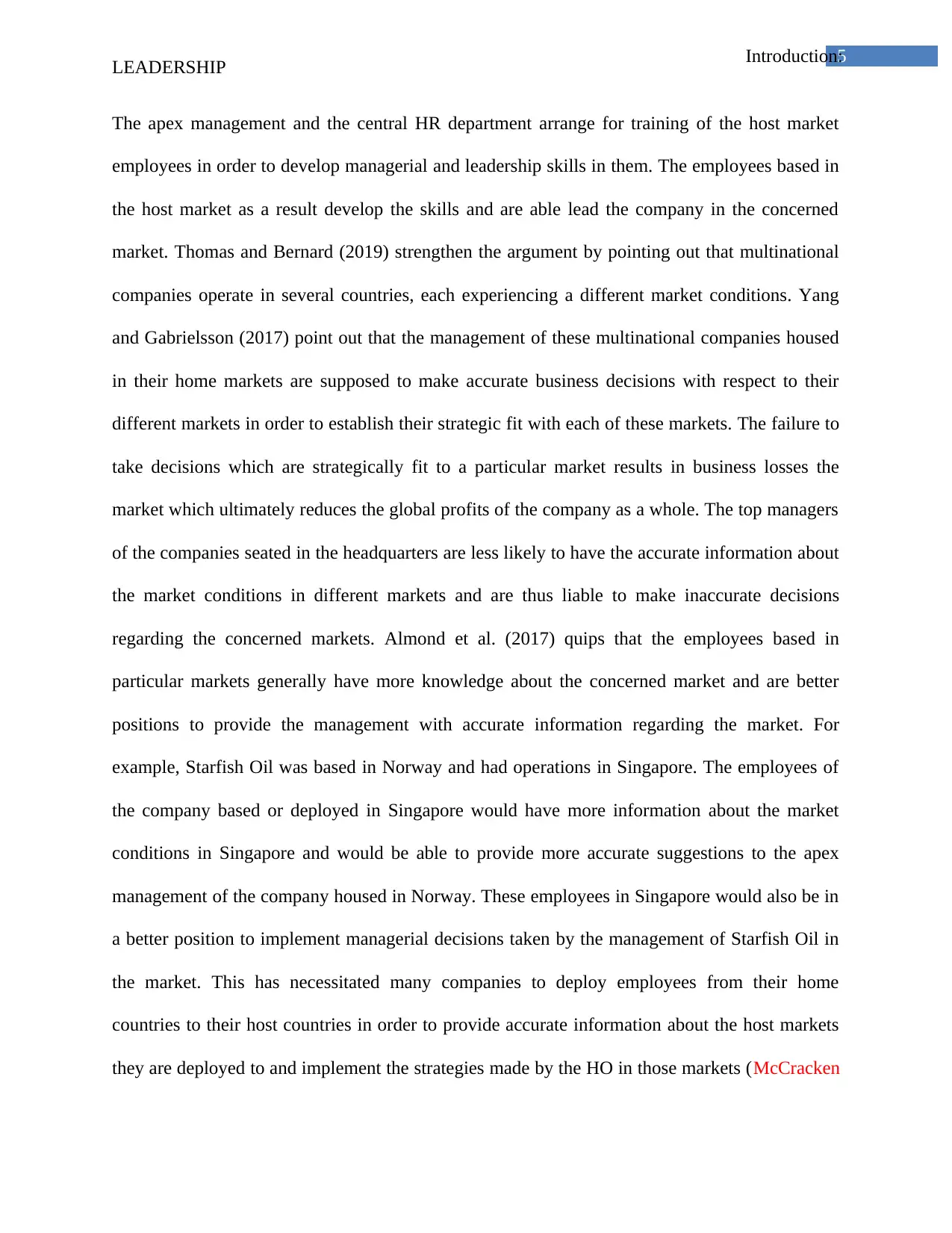
5Introduction:
LEADERSHIP
The apex management and the central HR department arrange for training of the host market
employees in order to develop managerial and leadership skills in them. The employees based in
the host market as a result develop the skills and are able lead the company in the concerned
market. Thomas and Bernard (2019) strengthen the argument by pointing out that multinational
companies operate in several countries, each experiencing a different market conditions. Yang
and Gabrielsson (2017) point out that the management of these multinational companies housed
in their home markets are supposed to make accurate business decisions with respect to their
different markets in order to establish their strategic fit with each of these markets. The failure to
take decisions which are strategically fit to a particular market results in business losses the
market which ultimately reduces the global profits of the company as a whole. The top managers
of the companies seated in the headquarters are less likely to have the accurate information about
the market conditions in different markets and are thus liable to make inaccurate decisions
regarding the concerned markets. Almond et al. (2017) quips that the employees based in
particular markets generally have more knowledge about the concerned market and are better
positions to provide the management with accurate information regarding the market. For
example, Starfish Oil was based in Norway and had operations in Singapore. The employees of
the company based or deployed in Singapore would have more information about the market
conditions in Singapore and would be able to provide more accurate suggestions to the apex
management of the company housed in Norway. These employees in Singapore would also be in
a better position to implement managerial decisions taken by the management of Starfish Oil in
the market. This has necessitated many companies to deploy employees from their home
countries to their host countries in order to provide accurate information about the host markets
they are deployed to and implement the strategies made by the HO in those markets (McCracken
LEADERSHIP
The apex management and the central HR department arrange for training of the host market
employees in order to develop managerial and leadership skills in them. The employees based in
the host market as a result develop the skills and are able lead the company in the concerned
market. Thomas and Bernard (2019) strengthen the argument by pointing out that multinational
companies operate in several countries, each experiencing a different market conditions. Yang
and Gabrielsson (2017) point out that the management of these multinational companies housed
in their home markets are supposed to make accurate business decisions with respect to their
different markets in order to establish their strategic fit with each of these markets. The failure to
take decisions which are strategically fit to a particular market results in business losses the
market which ultimately reduces the global profits of the company as a whole. The top managers
of the companies seated in the headquarters are less likely to have the accurate information about
the market conditions in different markets and are thus liable to make inaccurate decisions
regarding the concerned markets. Almond et al. (2017) quips that the employees based in
particular markets generally have more knowledge about the concerned market and are better
positions to provide the management with accurate information regarding the market. For
example, Starfish Oil was based in Norway and had operations in Singapore. The employees of
the company based or deployed in Singapore would have more information about the market
conditions in Singapore and would be able to provide more accurate suggestions to the apex
management of the company housed in Norway. These employees in Singapore would also be in
a better position to implement managerial decisions taken by the management of Starfish Oil in
the market. This has necessitated many companies to deploy employees from their home
countries to their host countries in order to provide accurate information about the host markets
they are deployed to and implement the strategies made by the HO in those markets (McCracken
⊘ This is a preview!⊘
Do you want full access?
Subscribe today to unlock all pages.

Trusted by 1+ million students worldwide
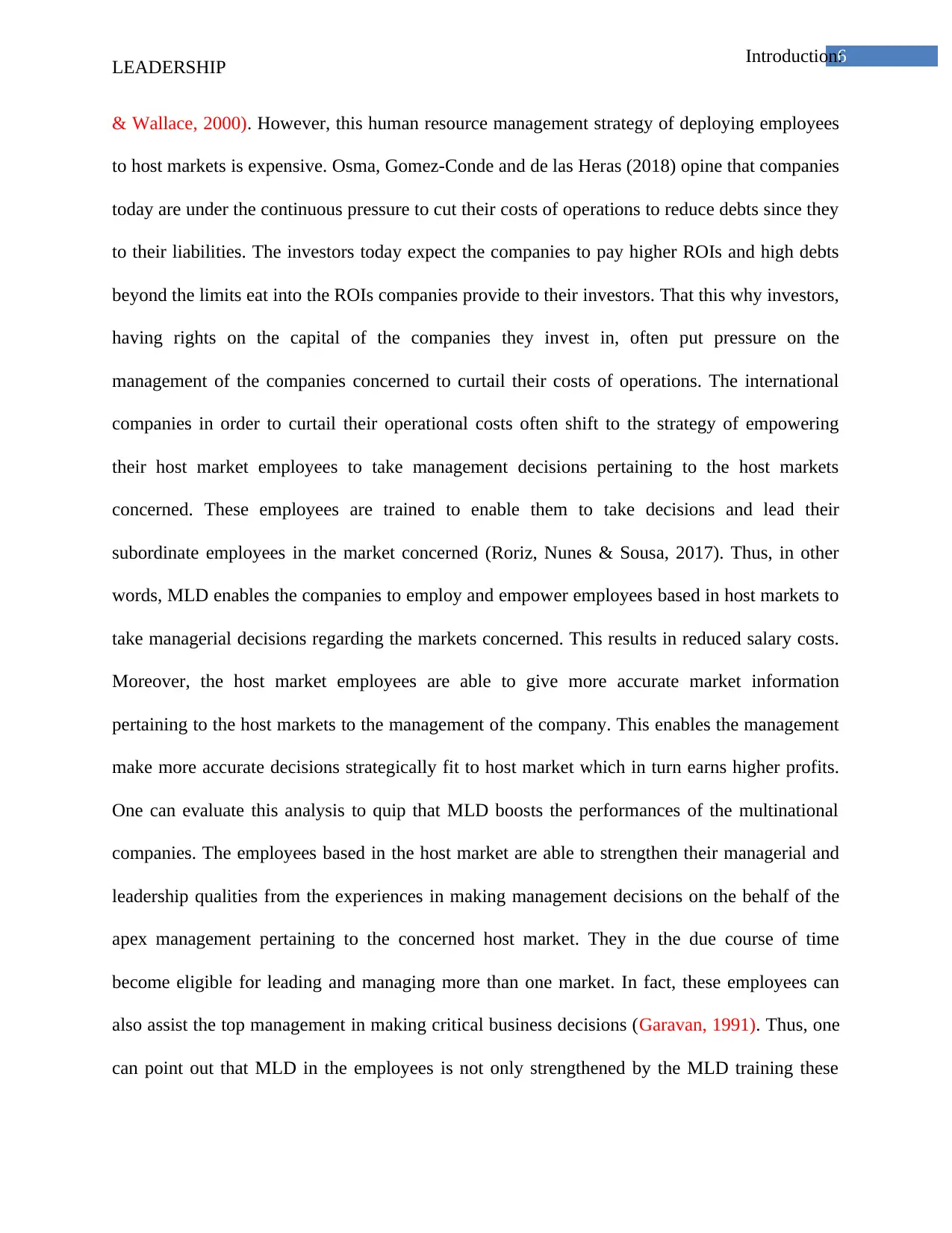
6Introduction:
LEADERSHIP
& Wallace, 2000). However, this human resource management strategy of deploying employees
to host markets is expensive. Osma, Gomez-Conde and de las Heras (2018) opine that companies
today are under the continuous pressure to cut their costs of operations to reduce debts since they
to their liabilities. The investors today expect the companies to pay higher ROIs and high debts
beyond the limits eat into the ROIs companies provide to their investors. That this why investors,
having rights on the capital of the companies they invest in, often put pressure on the
management of the companies concerned to curtail their costs of operations. The international
companies in order to curtail their operational costs often shift to the strategy of empowering
their host market employees to take management decisions pertaining to the host markets
concerned. These employees are trained to enable them to take decisions and lead their
subordinate employees in the market concerned (Roriz, Nunes & Sousa, 2017). Thus, in other
words, MLD enables the companies to employ and empower employees based in host markets to
take managerial decisions regarding the markets concerned. This results in reduced salary costs.
Moreover, the host market employees are able to give more accurate market information
pertaining to the host markets to the management of the company. This enables the management
make more accurate decisions strategically fit to host market which in turn earns higher profits.
One can evaluate this analysis to quip that MLD boosts the performances of the multinational
companies. The employees based in the host market are able to strengthen their managerial and
leadership qualities from the experiences in making management decisions on the behalf of the
apex management pertaining to the concerned host market. They in the due course of time
become eligible for leading and managing more than one market. In fact, these employees can
also assist the top management in making critical business decisions (Garavan, 1991). Thus, one
can point out that MLD in the employees is not only strengthened by the MLD training these
LEADERSHIP
& Wallace, 2000). However, this human resource management strategy of deploying employees
to host markets is expensive. Osma, Gomez-Conde and de las Heras (2018) opine that companies
today are under the continuous pressure to cut their costs of operations to reduce debts since they
to their liabilities. The investors today expect the companies to pay higher ROIs and high debts
beyond the limits eat into the ROIs companies provide to their investors. That this why investors,
having rights on the capital of the companies they invest in, often put pressure on the
management of the companies concerned to curtail their costs of operations. The international
companies in order to curtail their operational costs often shift to the strategy of empowering
their host market employees to take management decisions pertaining to the host markets
concerned. These employees are trained to enable them to take decisions and lead their
subordinate employees in the market concerned (Roriz, Nunes & Sousa, 2017). Thus, in other
words, MLD enables the companies to employ and empower employees based in host markets to
take managerial decisions regarding the markets concerned. This results in reduced salary costs.
Moreover, the host market employees are able to give more accurate market information
pertaining to the host markets to the management of the company. This enables the management
make more accurate decisions strategically fit to host market which in turn earns higher profits.
One can evaluate this analysis to quip that MLD boosts the performances of the multinational
companies. The employees based in the host market are able to strengthen their managerial and
leadership qualities from the experiences in making management decisions on the behalf of the
apex management pertaining to the concerned host market. They in the due course of time
become eligible for leading and managing more than one market. In fact, these employees can
also assist the top management in making critical business decisions (Garavan, 1991). Thus, one
can point out that MLD in the employees is not only strengthened by the MLD training these
Paraphrase This Document
Need a fresh take? Get an instant paraphrase of this document with our AI Paraphraser
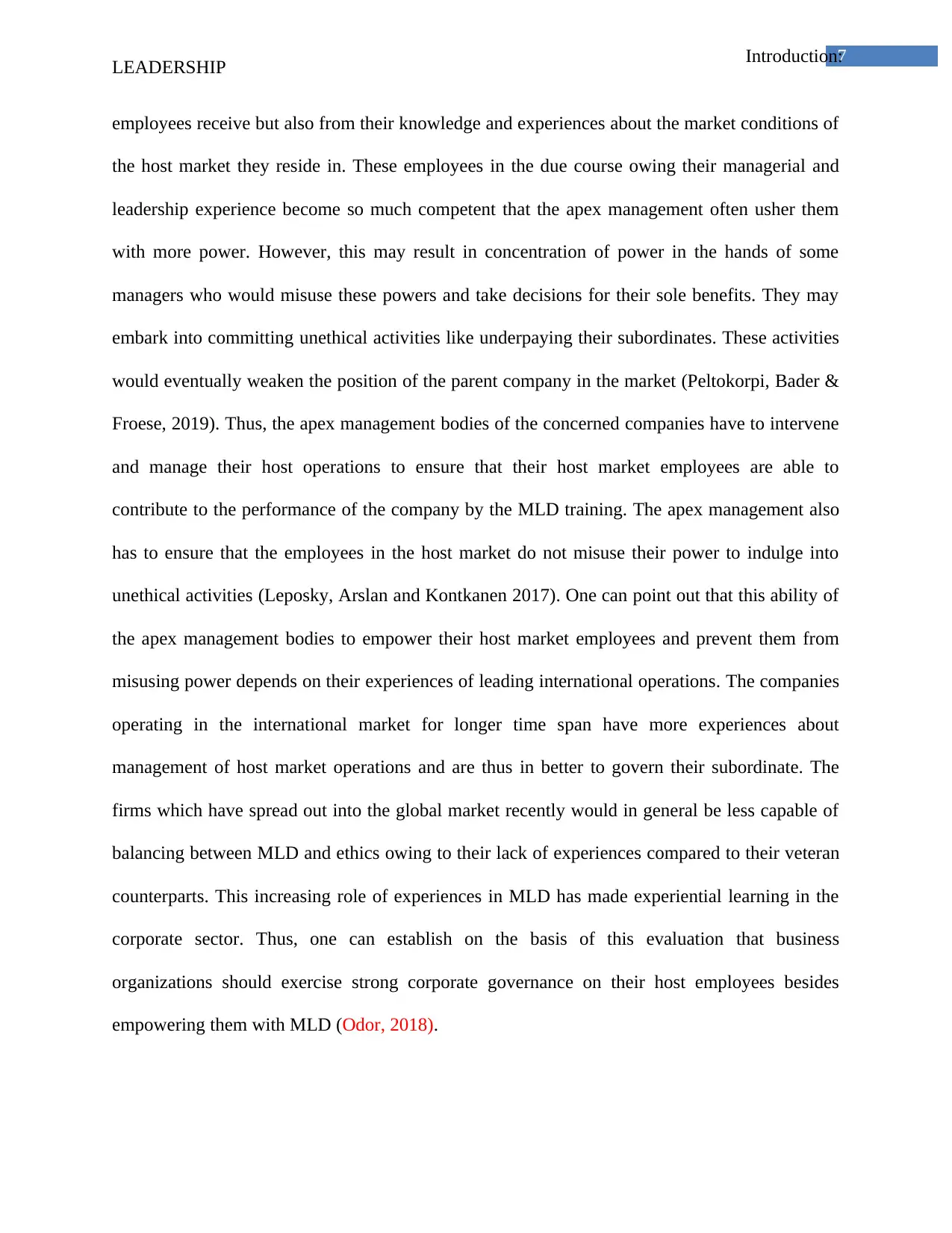
7Introduction:
LEADERSHIP
employees receive but also from their knowledge and experiences about the market conditions of
the host market they reside in. These employees in the due course owing their managerial and
leadership experience become so much competent that the apex management often usher them
with more power. However, this may result in concentration of power in the hands of some
managers who would misuse these powers and take decisions for their sole benefits. They may
embark into committing unethical activities like underpaying their subordinates. These activities
would eventually weaken the position of the parent company in the market (Peltokorpi, Bader &
Froese, 2019). Thus, the apex management bodies of the concerned companies have to intervene
and manage their host operations to ensure that their host market employees are able to
contribute to the performance of the company by the MLD training. The apex management also
has to ensure that the employees in the host market do not misuse their power to indulge into
unethical activities (Leposky, Arslan and Kontkanen 2017). One can point out that this ability of
the apex management bodies to empower their host market employees and prevent them from
misusing power depends on their experiences of leading international operations. The companies
operating in the international market for longer time span have more experiences about
management of host market operations and are thus in better to govern their subordinate. The
firms which have spread out into the global market recently would in general be less capable of
balancing between MLD and ethics owing to their lack of experiences compared to their veteran
counterparts. This increasing role of experiences in MLD has made experiential learning in the
corporate sector. Thus, one can establish on the basis of this evaluation that business
organizations should exercise strong corporate governance on their host employees besides
empowering them with MLD (Odor, 2018).
LEADERSHIP
employees receive but also from their knowledge and experiences about the market conditions of
the host market they reside in. These employees in the due course owing their managerial and
leadership experience become so much competent that the apex management often usher them
with more power. However, this may result in concentration of power in the hands of some
managers who would misuse these powers and take decisions for their sole benefits. They may
embark into committing unethical activities like underpaying their subordinates. These activities
would eventually weaken the position of the parent company in the market (Peltokorpi, Bader &
Froese, 2019). Thus, the apex management bodies of the concerned companies have to intervene
and manage their host operations to ensure that their host market employees are able to
contribute to the performance of the company by the MLD training. The apex management also
has to ensure that the employees in the host market do not misuse their power to indulge into
unethical activities (Leposky, Arslan and Kontkanen 2017). One can point out that this ability of
the apex management bodies to empower their host market employees and prevent them from
misusing power depends on their experiences of leading international operations. The companies
operating in the international market for longer time span have more experiences about
management of host market operations and are thus in better to govern their subordinate. The
firms which have spread out into the global market recently would in general be less capable of
balancing between MLD and ethics owing to their lack of experiences compared to their veteran
counterparts. This increasing role of experiences in MLD has made experiential learning in the
corporate sector. Thus, one can establish on the basis of this evaluation that business
organizations should exercise strong corporate governance on their host employees besides
empowering them with MLD (Odor, 2018).
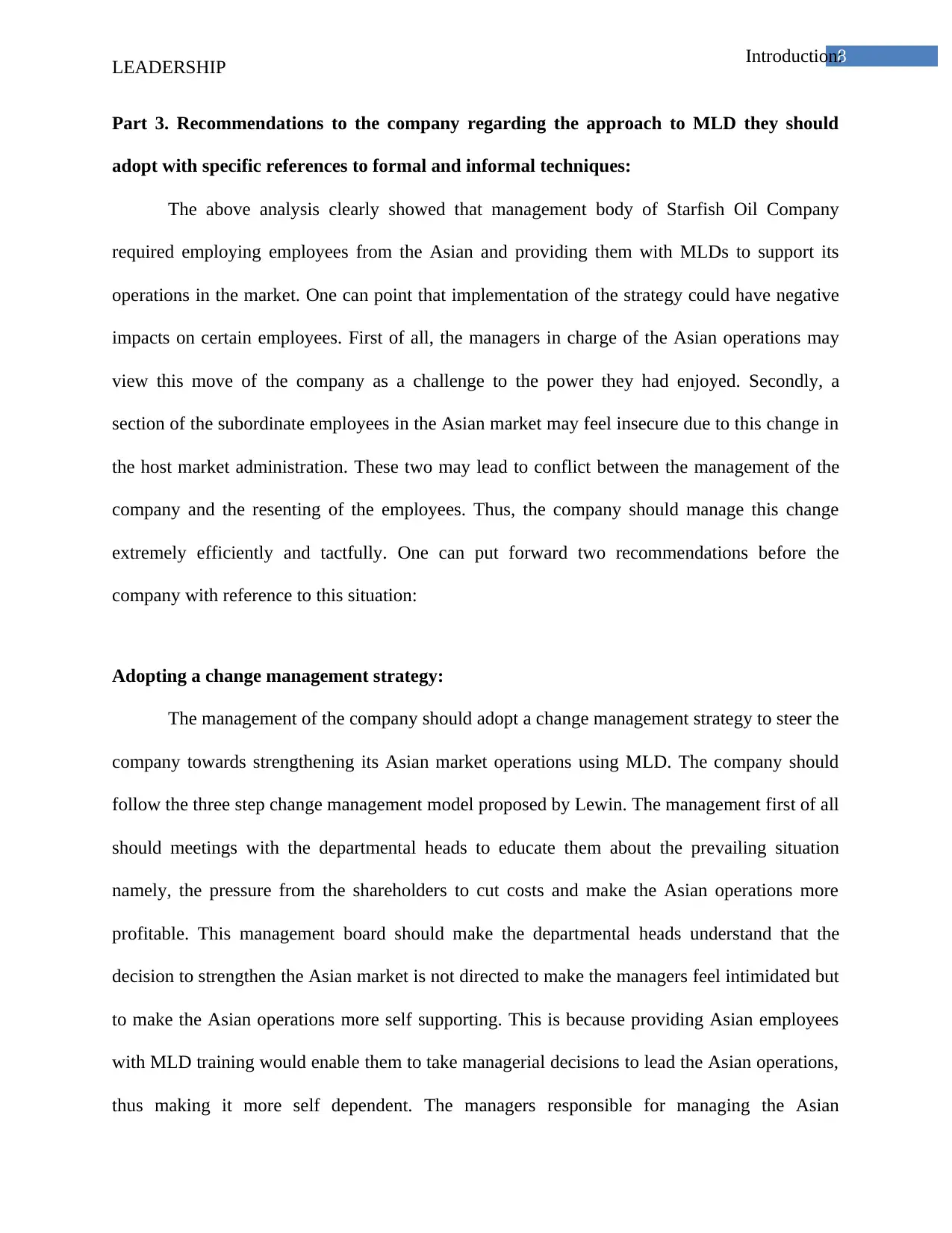
8Introduction:
LEADERSHIP
Part 3. Recommendations to the company regarding the approach to MLD they should
adopt with specific references to formal and informal techniques:
The above analysis clearly showed that management body of Starfish Oil Company
required employing employees from the Asian and providing them with MLDs to support its
operations in the market. One can point that implementation of the strategy could have negative
impacts on certain employees. First of all, the managers in charge of the Asian operations may
view this move of the company as a challenge to the power they had enjoyed. Secondly, a
section of the subordinate employees in the Asian market may feel insecure due to this change in
the host market administration. These two may lead to conflict between the management of the
company and the resenting of the employees. Thus, the company should manage this change
extremely efficiently and tactfully. One can put forward two recommendations before the
company with reference to this situation:
Adopting a change management strategy:
The management of the company should adopt a change management strategy to steer the
company towards strengthening its Asian market operations using MLD. The company should
follow the three step change management model proposed by Lewin. The management first of all
should meetings with the departmental heads to educate them about the prevailing situation
namely, the pressure from the shareholders to cut costs and make the Asian operations more
profitable. This management board should make the departmental heads understand that the
decision to strengthen the Asian market is not directed to make the managers feel intimidated but
to make the Asian operations more self supporting. This is because providing Asian employees
with MLD training would enable them to take managerial decisions to lead the Asian operations,
thus making it more self dependent. The managers responsible for managing the Asian
LEADERSHIP
Part 3. Recommendations to the company regarding the approach to MLD they should
adopt with specific references to formal and informal techniques:
The above analysis clearly showed that management body of Starfish Oil Company
required employing employees from the Asian and providing them with MLDs to support its
operations in the market. One can point that implementation of the strategy could have negative
impacts on certain employees. First of all, the managers in charge of the Asian operations may
view this move of the company as a challenge to the power they had enjoyed. Secondly, a
section of the subordinate employees in the Asian market may feel insecure due to this change in
the host market administration. These two may lead to conflict between the management of the
company and the resenting of the employees. Thus, the company should manage this change
extremely efficiently and tactfully. One can put forward two recommendations before the
company with reference to this situation:
Adopting a change management strategy:
The management of the company should adopt a change management strategy to steer the
company towards strengthening its Asian market operations using MLD. The company should
follow the three step change management model proposed by Lewin. The management first of all
should meetings with the departmental heads to educate them about the prevailing situation
namely, the pressure from the shareholders to cut costs and make the Asian operations more
profitable. This management board should make the departmental heads understand that the
decision to strengthen the Asian market is not directed to make the managers feel intimidated but
to make the Asian operations more self supporting. This is because providing Asian employees
with MLD training would enable them to take managerial decisions to lead the Asian operations,
thus making it more self dependent. The managers responsible for managing the Asian
⊘ This is a preview!⊘
Do you want full access?
Subscribe today to unlock all pages.

Trusted by 1+ million students worldwide
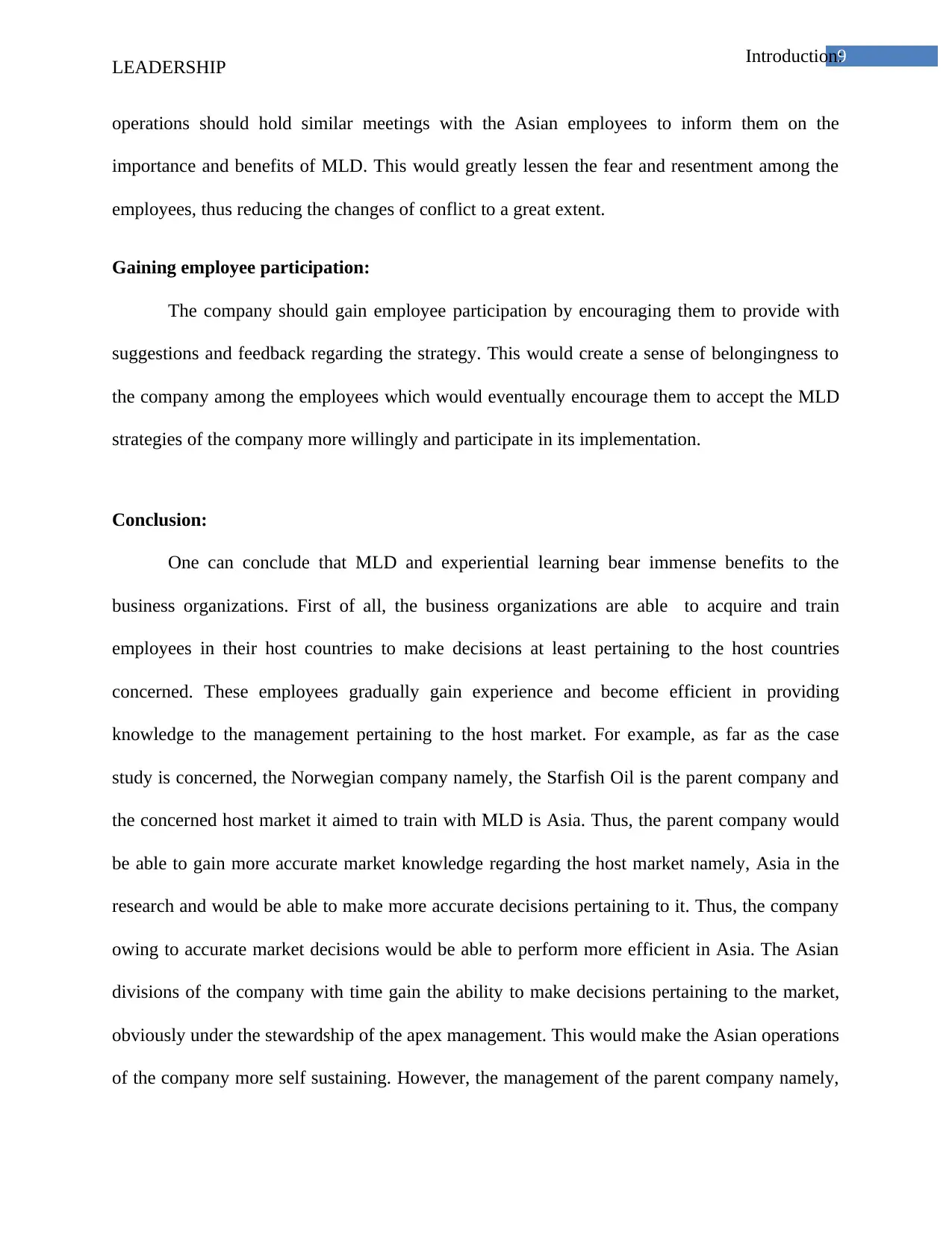
9Introduction:
LEADERSHIP
operations should hold similar meetings with the Asian employees to inform them on the
importance and benefits of MLD. This would greatly lessen the fear and resentment among the
employees, thus reducing the changes of conflict to a great extent.
Gaining employee participation:
The company should gain employee participation by encouraging them to provide with
suggestions and feedback regarding the strategy. This would create a sense of belongingness to
the company among the employees which would eventually encourage them to accept the MLD
strategies of the company more willingly and participate in its implementation.
Conclusion:
One can conclude that MLD and experiential learning bear immense benefits to the
business organizations. First of all, the business organizations are able to acquire and train
employees in their host countries to make decisions at least pertaining to the host countries
concerned. These employees gradually gain experience and become efficient in providing
knowledge to the management pertaining to the host market. For example, as far as the case
study is concerned, the Norwegian company namely, the Starfish Oil is the parent company and
the concerned host market it aimed to train with MLD is Asia. Thus, the parent company would
be able to gain more accurate market knowledge regarding the host market namely, Asia in the
research and would be able to make more accurate decisions pertaining to it. Thus, the company
owing to accurate market decisions would be able to perform more efficient in Asia. The Asian
divisions of the company with time gain the ability to make decisions pertaining to the market,
obviously under the stewardship of the apex management. This would make the Asian operations
of the company more self sustaining. However, the management of the parent company namely,
LEADERSHIP
operations should hold similar meetings with the Asian employees to inform them on the
importance and benefits of MLD. This would greatly lessen the fear and resentment among the
employees, thus reducing the changes of conflict to a great extent.
Gaining employee participation:
The company should gain employee participation by encouraging them to provide with
suggestions and feedback regarding the strategy. This would create a sense of belongingness to
the company among the employees which would eventually encourage them to accept the MLD
strategies of the company more willingly and participate in its implementation.
Conclusion:
One can conclude that MLD and experiential learning bear immense benefits to the
business organizations. First of all, the business organizations are able to acquire and train
employees in their host countries to make decisions at least pertaining to the host countries
concerned. These employees gradually gain experience and become efficient in providing
knowledge to the management pertaining to the host market. For example, as far as the case
study is concerned, the Norwegian company namely, the Starfish Oil is the parent company and
the concerned host market it aimed to train with MLD is Asia. Thus, the parent company would
be able to gain more accurate market knowledge regarding the host market namely, Asia in the
research and would be able to make more accurate decisions pertaining to it. Thus, the company
owing to accurate market decisions would be able to perform more efficient in Asia. The Asian
divisions of the company with time gain the ability to make decisions pertaining to the market,
obviously under the stewardship of the apex management. This would make the Asian operations
of the company more self sustaining. However, the management of the parent company namely,
Paraphrase This Document
Need a fresh take? Get an instant paraphrase of this document with our AI Paraphraser
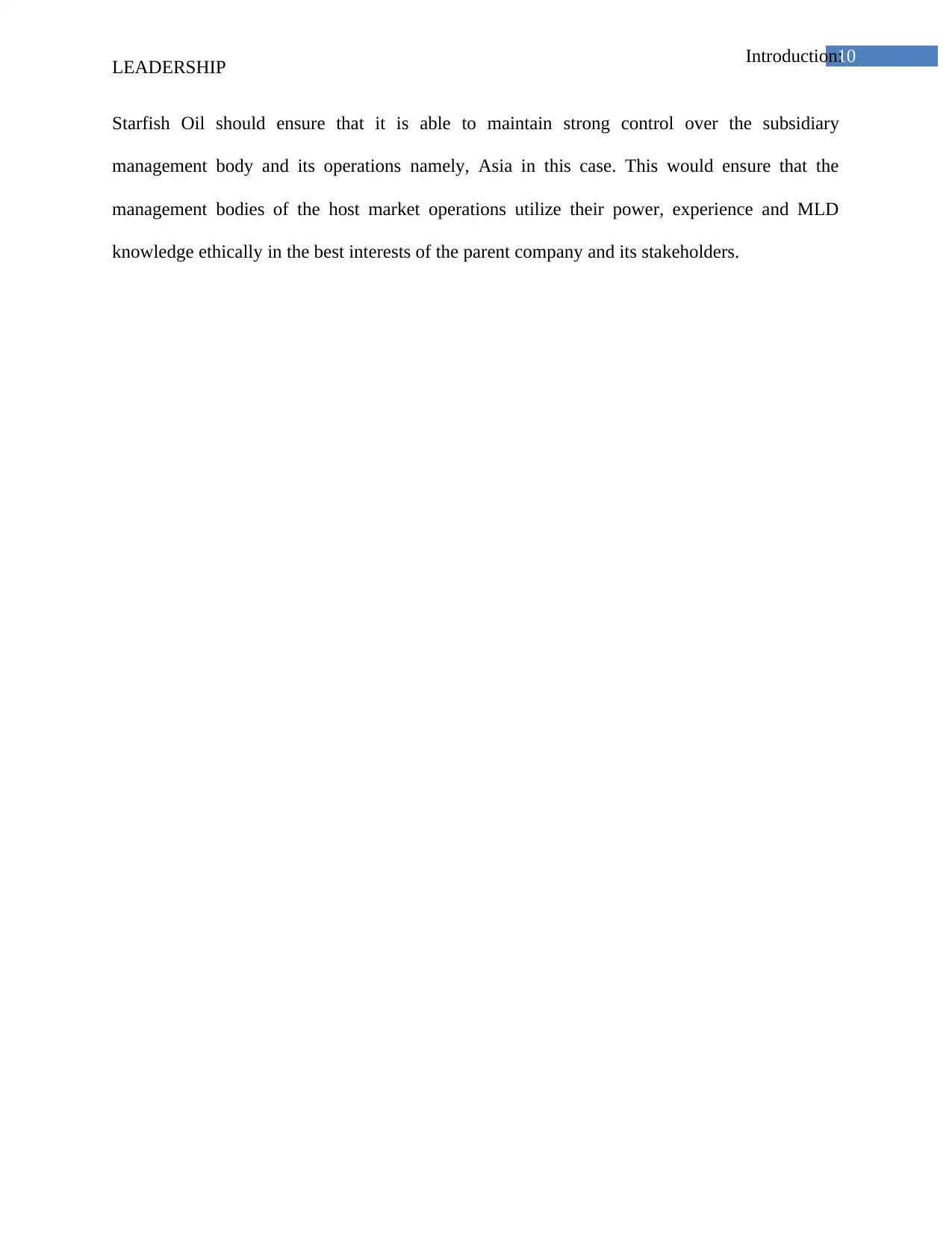
10Introduction:
LEADERSHIP
Starfish Oil should ensure that it is able to maintain strong control over the subsidiary
management body and its operations namely, Asia in this case. This would ensure that the
management bodies of the host market operations utilize their power, experience and MLD
knowledge ethically in the best interests of the parent company and its stakeholders.
LEADERSHIP
Starfish Oil should ensure that it is able to maintain strong control over the subsidiary
management body and its operations namely, Asia in this case. This would ensure that the
management bodies of the host market operations utilize their power, experience and MLD
knowledge ethically in the best interests of the parent company and its stakeholders.
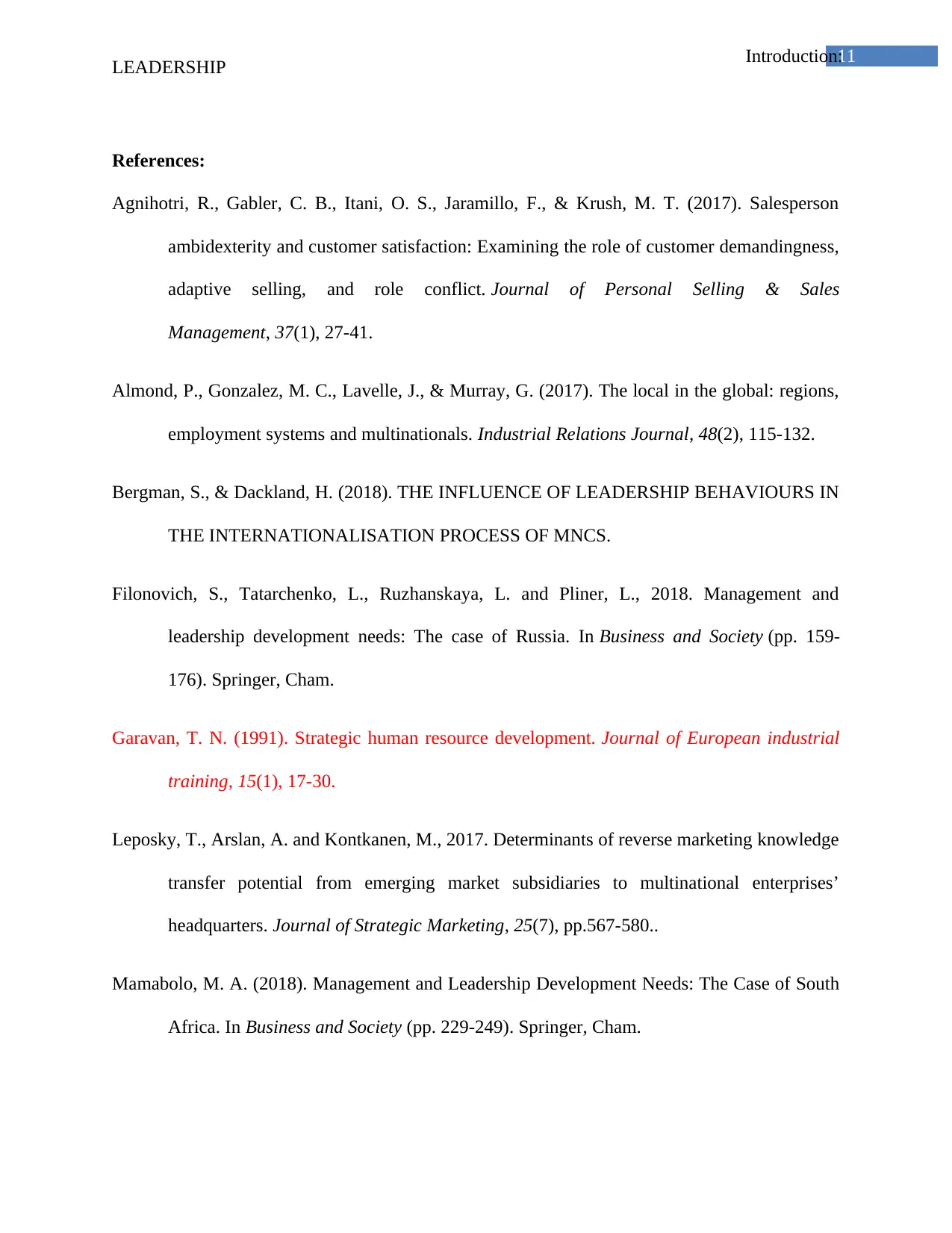
11Introduction:
LEADERSHIP
References:
Agnihotri, R., Gabler, C. B., Itani, O. S., Jaramillo, F., & Krush, M. T. (2017). Salesperson
ambidexterity and customer satisfaction: Examining the role of customer demandingness,
adaptive selling, and role conflict. Journal of Personal Selling & Sales
Management, 37(1), 27-41.
Almond, P., Gonzalez, M. C., Lavelle, J., & Murray, G. (2017). The local in the global: regions,
employment systems and multinationals. Industrial Relations Journal, 48(2), 115-132.
Bergman, S., & Dackland, H. (2018). THE INFLUENCE OF LEADERSHIP BEHAVIOURS IN
THE INTERNATIONALISATION PROCESS OF MNCS.
Filonovich, S., Tatarchenko, L., Ruzhanskaya, L. and Pliner, L., 2018. Management and
leadership development needs: The case of Russia. In Business and Society (pp. 159-
176). Springer, Cham.
Garavan, T. N. (1991). Strategic human resource development. Journal of European industrial
training, 15(1), 17-30.
Leposky, T., Arslan, A. and Kontkanen, M., 2017. Determinants of reverse marketing knowledge
transfer potential from emerging market subsidiaries to multinational enterprises’
headquarters. Journal of Strategic Marketing, 25(7), pp.567-580..
Mamabolo, M. A. (2018). Management and Leadership Development Needs: The Case of South
Africa. In Business and Society (pp. 229-249). Springer, Cham.
LEADERSHIP
References:
Agnihotri, R., Gabler, C. B., Itani, O. S., Jaramillo, F., & Krush, M. T. (2017). Salesperson
ambidexterity and customer satisfaction: Examining the role of customer demandingness,
adaptive selling, and role conflict. Journal of Personal Selling & Sales
Management, 37(1), 27-41.
Almond, P., Gonzalez, M. C., Lavelle, J., & Murray, G. (2017). The local in the global: regions,
employment systems and multinationals. Industrial Relations Journal, 48(2), 115-132.
Bergman, S., & Dackland, H. (2018). THE INFLUENCE OF LEADERSHIP BEHAVIOURS IN
THE INTERNATIONALISATION PROCESS OF MNCS.
Filonovich, S., Tatarchenko, L., Ruzhanskaya, L. and Pliner, L., 2018. Management and
leadership development needs: The case of Russia. In Business and Society (pp. 159-
176). Springer, Cham.
Garavan, T. N. (1991). Strategic human resource development. Journal of European industrial
training, 15(1), 17-30.
Leposky, T., Arslan, A. and Kontkanen, M., 2017. Determinants of reverse marketing knowledge
transfer potential from emerging market subsidiaries to multinational enterprises’
headquarters. Journal of Strategic Marketing, 25(7), pp.567-580..
Mamabolo, M. A. (2018). Management and Leadership Development Needs: The Case of South
Africa. In Business and Society (pp. 229-249). Springer, Cham.
⊘ This is a preview!⊘
Do you want full access?
Subscribe today to unlock all pages.

Trusted by 1+ million students worldwide
1 out of 14
Related Documents
Your All-in-One AI-Powered Toolkit for Academic Success.
+13062052269
info@desklib.com
Available 24*7 on WhatsApp / Email
![[object Object]](/_next/static/media/star-bottom.7253800d.svg)
Unlock your academic potential
Copyright © 2020–2026 A2Z Services. All Rights Reserved. Developed and managed by ZUCOL.




